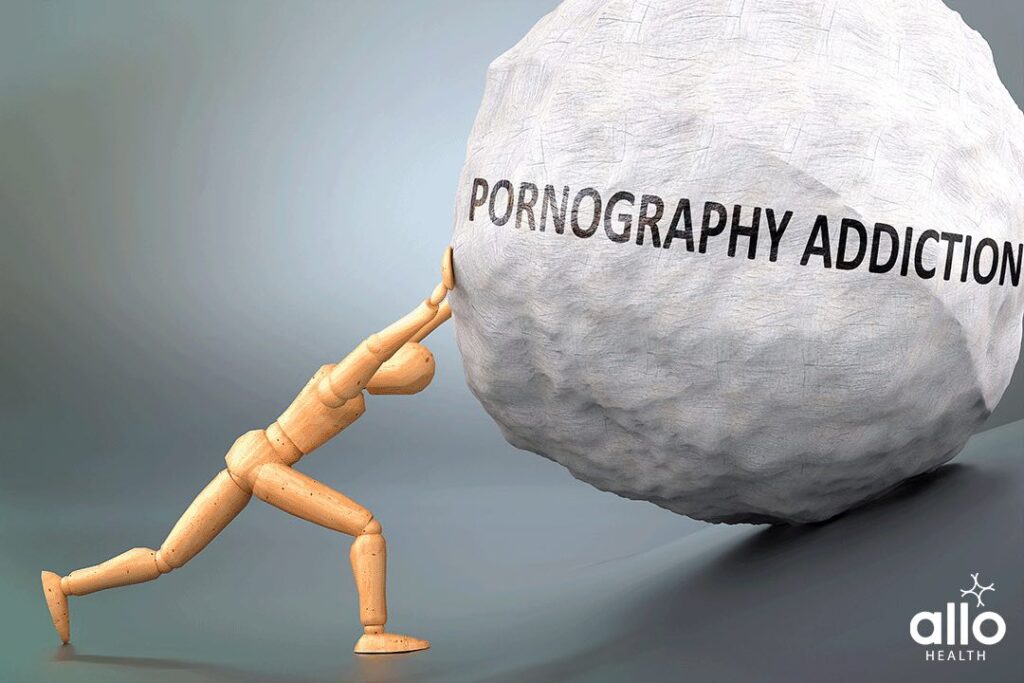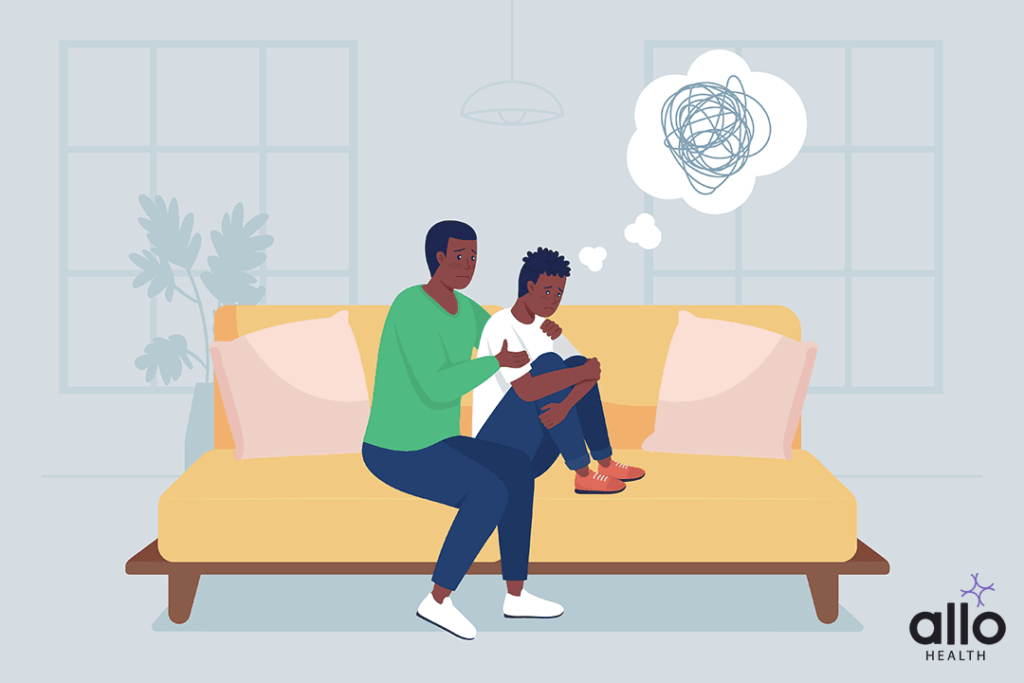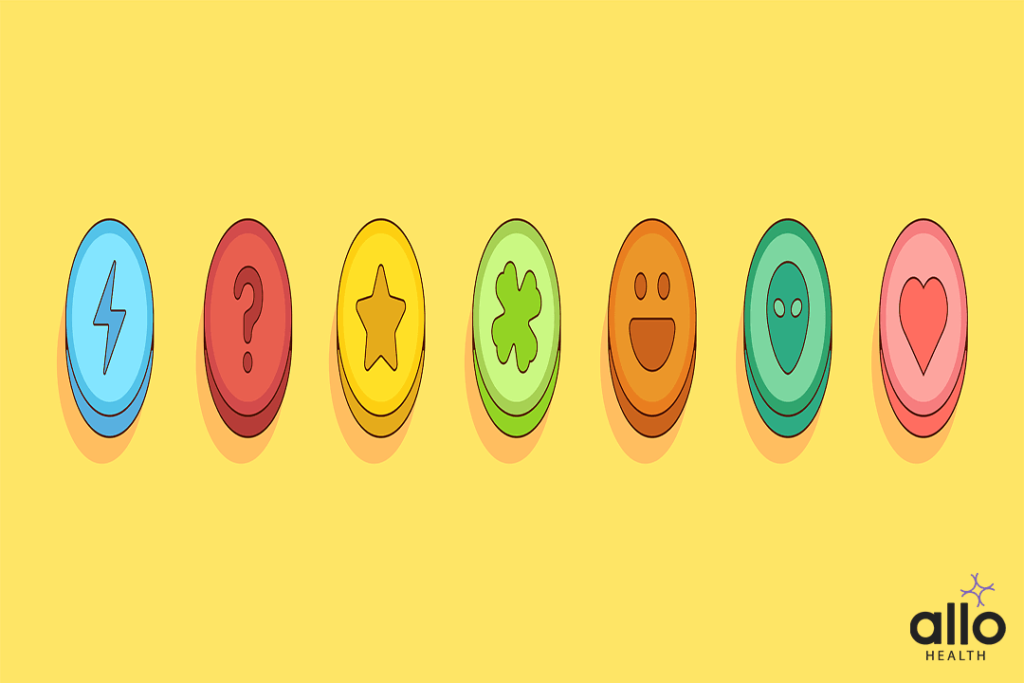How To Identify Porn Addiction?

Allo Health is dedicated to personalized well-being, offering support and trusted information tailored to individual health goals. The platform emphasizes human-generated content, led by a distinguished medical team of experts, including physicians and sexual health specialists. Their commitment to credibility involves rigorous fact-checking, authoritative research, and continuous updates to ensure accurate, up-to-date information. Allo Health's unique approach goes beyond conventional platforms, providing expert-led insights and a continuous commitment to excellence, with user feedback playing a crucial role in shaping the platform's authoritative voice.

An early career psychiatrist with extensive experience in general adult psychiatry, relationship issues, psychosexual problems & special interest in sexual medicine, disorders with addictive behaviours and Obsessive Compulsive disorders. He is an astute physician with excellent academic record and research experience. He is also a member of World Health Organisation and World Psychiatric Association. His vision and goal for Allo is an inclusive, accessible digital health clinic for psychosexual difficulties.
Why This Was Upated?
Our experts continually monitor the health and wellness space, and we update our articles when new information became available.
Updated on 08 June, 2024
- Article was updated as part of our commitment to diversity, equity, and inclusion.

"The following blog article provides general information and insights on various topics. However, it is important to note that the information presented is not intended as professional advice in any specific field or area. The content of this blog is for general educational and informational purposes only.
Book consultation
The content should not be interpreted as endorsement, recommendation, or guarantee of any product, service, or information mentioned. Readers are solely responsible for the decisions and actions they take based on the information provided in this blog. It is essential to exercise individual judgment, critical thinking, and personal responsibility when applying or implementing any information or suggestions discussed in the blog."
Porn addiction, also known as compulsive pornography use, is a growing concern among individuals and families. It can have negative impacts on personal relationships, work productivity, and overall mental and physical health. The hallmark of porn addiction is the actions or behaviors that individual engages have a negative impact on their life. They still engage in these behaviors regardless – unable to resist them.
Oftentimes with addiction, individuals experience it and aren?t able to comprehend that they are engaging in addictive behavior. However, in other cases, people are aware of this, but are not interested in stopping, or can?t do so.
There are signs of porn addiction that can help experts diagnose patients.
Indicators Of Porn Addiction
Excessive viewing
One of the most obvious signs of porn addiction is viewing pornography to an excessive extent. This may involve viewing porn for long periods of time, or feeling an urge to view it multiple times throughout the day.
Loss of control
Individuals struggling with porn addiction may have difficulty controlling their use of pornography, even when they try to stop or reduce their consumption. They may feel an overwhelming urge to view porn, and may be unable to resist this urge even if it is causing problems in their lives.
While pornography can be a healthy and enjoyable form of entertainment, it can also become a harmful and destructive habit for some individuals. One of the common symptoms of porn addiction is the loss of control over one’s use of pornography. This can lead to significant problems in a person’s personal, social, and professional life.
If you or someone you know is struggling with porn addiction and the loss of control that comes with it, it’s important to understand that you are not alone and that there is help available.
Here are some tips for managing and overcoming this difficult concern:
Seek support
One of the most effective ways to overcome porn addiction and regain control is to seek support from friends, family, or a professional therapist. A supportive network can provide the necessary encouragement and guidance to help you overcome your addiction and make positive changes in your life.
Practice self-care
Taking care of yourself physically and emotionally is essential to overcoming any addiction. This includes getting enough sleep, eating a healthy diet, and engaging in regular physical activity. It’s also important to manage stress and practice relaxation techniques, such as meditation or yoga.
Set boundaries
Setting boundaries around your use of pornography is crucial to maintaining control. This may include setting limits on the amount of time you spend viewing pornography or setting limits on the types of content you view. You may also want to consider using internet filtering software to block access to inappropriate sites.
Find healthy outlets
One of the challenges of overcoming porn addiction is finding healthy outlets for sexual energy and desire. This may include finding ways to connect with a partner, exploring new hobbies and interests, or engaging in physical activities.
By seeking support, practicing self-care, setting boundaries, and finding healthy outlets, you can overcome your addiction and regain control of your life.
Negative impacts on relationships 
Porn addiction can have a negative impact on personal relationships, as it may lead to isolation, secrecy, and distance from loved ones. It can also cause problems in romantic relationships, such as a lack of intimacy or difficulty maintaining a healthy sexual relationship.
One of the main negative impacts of porn addiction on relationships is the lack of intimacy and emotional connection. When a person becomes addicted to pornography, they may begin to prioritize their desire for pornography over their relationship with their partner. This can lead to feelings of neglect, loneliness, and betrayal in the partner, and can ultimately lead to the breakdown of the relationship.
In addition to the lack of intimacy, porn addiction can also lead to problems with communication and trust. The secretive nature of porn addiction can create a sense of mistrust and cause damage to the foundation of the relationship. It can also lead to a lack of communication, as the addict may be reluctant to discuss their addiction with their partner.
Porn addiction can also have negative impacts on the physical aspect of a relationship. Some individuals who struggle with porn addiction may have difficulty becoming aroused or maintaining an erection during sexual activity with their partner, leading to problems with sexual performance.
Treatment options such as therapy, support groups, and medication can be effective in addressing and overcoming this issue. By addressing the problem and seeking help through relationship counseling, it is possible to heal and strengthen the relationship.
Changes in behavior
Porn addiction may lead to changes in behavior, such as neglecting responsibilities or hobbies in favor of viewing pornography, or using porn as a coping mechanism to avoid dealing with stress or negative emotions.
While some of these changes may be subtle, others may be more noticeable and have a significant impact on a person’s daily life.
One of the most common changes in behavior associated with porn addiction is an increase in secretive or isolated behavior. A person who is struggling with porn addiction may try to hide their behavior from others, leading to a sense of isolation and disconnection from loved ones. They may also spend more time alone in order to view pornography, leading to a lack of engagement in social activities and relationships.
Porn addiction can also lead to changes in sexual behavior. Some individuals may begin to engage in risky or dangerous sexual behaviors as a result of their addiction, such as seeking out casual or unprotected sex. This can lead to increased risk of sexually transmitted infections and unintended pregnancies.
Other changes in behavior associated with porn addiction may include an increase in irritability or moodiness, difficulty with concentration and focus, and an overall decline in physical and mental health.
Physical or emotional withdrawal symptoms
Pornography addiction can lead to physical and emotional withdrawal symptoms when an individual tries to stop or reduce their use of pornography. These symptoms can range from mild to severe and can vary from person to person.
Physical Withdrawal Symptoms?
- Fatigue
- Irritability
- Difficulty sleeping
- Decreased appetite
- Headaches
Emotional Withdrawal Symptoms
- Anxiety
- Depression
- Mood swings
- Cravings for pornography
- Difficulty concentrating
It’s important to note that the severity and duration of withdrawal symptoms can vary depending on the individual and their level of addiction. In some cases, withdrawal symptoms may be mild and resolve within a few days. In other cases, they may be more severe and persist for a longer period of time.
Unrealistic expectations of sexual activity and/or partners
Pornography addiction can lead to the development of unrealistic expectations of sexual activity and/or partners. When an individual becomes overly reliant on pornography as their primary source of sexual arousal and pleasure, they may begin to develop distorted and unrealistic views of what is normal or acceptable in sexual relationships.
Excessive exposure to pornography can lead to the belief that certain sexual behaviors or body types are the norm, which can create unrealistic expectations for oneself and one’s partners. This can lead to disappointment, frustration, and conflict in relationships and can ultimately result in a decline in sexual satisfaction.
There are different types of porn – some of which portrays pleasure and pain. If an individual is addicted to porn, they might try to imitate what they have seen with their partner(s). Sometimes, this can cause a concern within the couple, as they can not be on the same page when it comes to sexual intimacy. Partner(s) may feel isolated and scared about the high risk behavior, which can deeply affect their relationship with sex.
In addition, pornography often portrays unrealistic and unhealthy power dynamics in sexual relationships, which can lead to the development of unrealistic expectations for one’s own relationships. This can result in the objectification of partners and a lack of respect and equality in the relationship.
Lack of satisfactory pleasure
Porn addiction can be to identify and address. It is not uncommon for individuals struggling with porn addiction to try to hide their behavior or minimize its impact on their lives. However, there are certain indicators that may suggest someone is struggling with an addiction to pornography.
Porn addiction, also known as compulsive pornography use, is a growing concern among individuals and families. While pornography may initially provide a sense of pleasure or escape, over time it can lead to a lack of satisfaction and even negative consequences.
One of the key characteristics of addiction is the inability to achieve the same level of pleasure or enjoyment from the substance or behavior as in the past. This is known as tolerance. As an individual with porn addiction continues to view pornography, they may find that they need to view increasingly extreme or taboo content in order to achieve the same level of pleasure. This can lead to a cycle of seeking out more and more extreme content, which can have negative impacts on their mental and emotional well-being.
In addition to tolerance, pornography addiction can lead to a lack of satisfaction in other areas of life. For example, an individual may find it difficult to maintain intimate relationships or may struggle with performance anxiety in sexual situations. They may also experience feelings of shame or guilt about their addiction, which can further erode their sense of satisfaction and weld work towards recovery. It’s never too late to make positive changes and improve your overall well-being.
Types Of Porn Addicts

There are several different types of pornography addicts, each with their own unique characteristics and challenges. Some common types of pornography addicts include:
Process addicts
Process addicts are individuals who are addicted to the process of viewing pornography and the feelings of excitement and arousal that come with it. They may spend excessive amounts of time viewing pornography and may have difficulty reducing or stopping their use.
Escalators
Escalators are individuals who have a high tolerance for pornography and may need to view increasingly graphic or extreme content in order to achieve the same level of arousal. They may also engage in risky or dangerous behaviors in order to access this type of content.
Trauma re-enactors
Trauma re-enactors are individuals who may use pornography as a way to cope with past trauma or abuse. They may view pornography as a way to numb their emotions or escape from their reality.
Relationship avoiders
Relationship avoiders may use pornography as a way to avoid intimacy and emotional connection in their relationships. They may also view pornography as a way to cope with feelings of inadequacy or insecurity.
Am I Addicted To Porn?
If you suspect that you or someone you know may be struggling with porn addiction, it’s important to seek help and support. Here are some steps you can take to identify porn addiction and take steps towards recovery:
Recognize the signs of addiction
Some common signs of porn addiction include an inability to stop using pornography, experiencing cravings for pornography, and feeling distressed when unable to view it. Other signs may include neglecting important responsibilities or relationships in favor of viewing porn, feeling shame or guilt about viewing porn, and experiencing physical or emotional withdrawal symptoms when trying to stop.
Consider the impact on your life
Think about how pornography use is affecting your life. Are you having difficulty maintaining relationships or meeting your responsibilities due to your use of porn? Are you neglecting your physical or mental health due to your addiction? It’s important to take a realistic look at how your porn use is impacting your overall well-being.
Seek professional help
If you believe that you or someone you know is struggling with porn addiction, it’s important to seek help from a qualified professional. This can be a therapist or counselor who specializes in addiction treatment, or a support group like Sex Addicts Anonymous (SAA). These resources can provide you with the support and guidance you need to overcome your addiction and work towards recovery.
Practice self-care
In addition to seeking professional help, it’s important to practice self-care and engage in activities that promote physical and mental well-being. This may include exercising, eating a healthy diet, getting enough sleep, and engaging in activities that bring joy and meaning to your life.
Porn addiction is a complex concern that requires professional help and support to overcome. If you suspect that you or someone you know is struggling with porn addiction, don’t hesitate to reach out for help. With the right resources and support, it is possible to overcome this addiction and build a healthy, fulfilling life.
Substance Abuse Disorders And Porn Addiction
Pornography addiction can sometimes be accompanied by substance use disorders. Substance use disorders, also known as substance abuse or addiction, refer to a pattern of harmful use of drugs or alcohol that leads to significant problems or distress.
Substance use disorders and pornography addiction can often co-occur, with one condition exacerbating the other. In some cases, an individual may turn to drugs or alcohol as a coping mechanism to deal with the negative emotions and stress associated with their pornography addiction. In other cases, the use of drugs or alcohol may increase the individual’s risk-taking behavior and lead to increased use of pornography.
The co-occurrence of substance use disorders and pornography addiction can have serious negative consequences on an individual’s physical and mental health, as well as their relationships and overall well-being.
Sexual Addiction And Porn Addiction
Sexual addiction and pornography addiction are related but distinct conditions. Sexual addiction, also known as hypersexual disorder or compulsive sexual behavior disorder, is characterized by an excessive and unhealthy focus on sexual behavior and thoughts. Pornography addiction, on the other hand, refers to a specific type of sexual addiction that involves the compulsive use of pornography.
Both sexual addiction and pornography addiction can have serious negative impacts on an individual’s personal, social, and professional life. They can lead to problems with relationships, work, and overall well-being.
Symptoms of sexual addiction
- An excessive focus on sexual thoughts and behaviors
- An inability to control or reduce sexual behaviors
- Neglecting responsibilities and obligations in favor of sexual activity
- Continued engagement in risky or dangerous sexual behaviors
- Negative consequences as a result of sexual behavior, such as STIs or unintended pregnancies
Symptoms of pornography addiction
- An excessive focus on pornography and the need to view it more frequently or for longer periods of time
- An inability to control or reduce the use of pornography
- Neglecting responsibilities and obligations in favor of viewing pornography
- Using pornography as a coping mechanism to deal with negative emotions or stress
- Negative consequences as a result of pornography use, such as problems with relationships or work
Mental Disorders And Porn Addiction
Mental disorders can be a risk factor for pornography addiction. Mental disorders refer to a broad range of conditions that affect an individual’s mood, thoughts, and behavior. Some common mental disorders that may increase the risk for pornography addiction include depression, anxiety, and personality disorders.
There is a complex relationship between mental disorders and pornography addiction. In some cases, an individual may turn to pornography as a coping mechanism to deal with the negative emotions and stress associated with their mental disorder. They may view pornography as a way to numb their emotions or escape from their reality.
On the other hand, excessive use of pornography can also contribute to the development or worsening of mental disorders. Pornography addiction can lead to feelings of guilt, shame, and low self-esteem, which can contribute to the development of depression. It can also interfere with an individual’s relationships and overall well-being, leading to feelings of isolation and a decline in social support.
Depression
Depression is a risk factor for pornography addiction. Depression is a common and serious mental health condition that is characterized by persistent feelings of sadness, hopelessness, and a lack of interest in activities that were previously enjoyable.
There is a complex relationship between depression and pornography addiction. In some cases, an individual may turn to pornography as a coping mechanism to deal with feelings of depression and other negative emotions. However, excessive use of pornography can also contribute to the development or worsening of depression.
Pornography addiction can lead to feelings of guilt, shame, and low self-esteem, which can contribute to the development of depression. It can also interfere with an individual’s relationships and overall well-being, leading to feelings of isolation and a decline in social support.
Sexual Abuse And Porn Addiction
Sexual abuse is a risk factor for pornography addiction. Sexual abuse refers to any type of non-consensual sexual activity, including rape, molestation, and sexual harassment. Sexual abuse can have serious and long-lasting effects on an individual’s physical and mental health, including an increased risk for pornography addiction.
Individuals who have experienced sexual abuse may turn to pornography as a coping mechanism to deal with the trauma and negative emotions associated with the abuse. They may view pornography as a way to numb their emotions or escape from their reality. In some cases, pornography may be used as a way to re-enact or cope with the abuse.
However, it’s important to note that not all individuals who have experienced sexual abuse will develop a pornography addiction. The relationship between sexual abuse and pornography addiction is complex and can be influenced by a variety of factors, including an individual’s coping mechanisms, support system, and overall mental health.
Recreational Drugs And Porn Addiction

Recreational drugs can be a risk factor for pornography addiction. Recreational drugs refer to substances that are used for non-medical purposes, such as to alter one’s mood or perception. Some common recreational drugs include alcohol, marijuana, and stimulants like cocaine and amphetamines.
There is a complex relationship between recreational drug use and pornography addiction. In some cases, an individual may turn to pornography as a coping mechanism to deal with the negative emotions and stress associated with drug use. They may also use drugs to enhance the effects of pornography and increase arousal.
On the other hand, excessive use of pornography can also contribute to an increased risk for recreational drug use. The secretive and isolating nature of pornography addiction can lead to an increased risk for substance abuse and addiction.
It’s important to note that not all individuals who use recreational drugs will develop a pornography addiction, and not all individuals who struggle with pornography addiction will abuse drugs.
Is Porn Addiction A Behavioral Addiction?
Pornography addiction is considered a behavioral addiction. Behavioral addiction refers to a pattern of harmful and compulsive behaviors that are similar to substance addiction. These behaviors can include activities such as gambling, shopping, and internet use, as well as pornography addiction.
Like substance addiction, pornography addiction involves an inability to control or reduce the behavior, despite negative consequences. It can also involve the development of tolerance, where an individual needs to view more or more extreme pornography in order to achieve the same level of arousal.
Pornography addiction can have serious negative impacts on an individual’s personal, social, and professional life. It can lead to problems with relationships, work, and overall well-being.
Sexual health is as important as physical and mental health. In most cases, one consultation can go a long way. Personalised, discreet, and judgement-free treatment at your fingertips – book an online consultation with one of Allo?s leading experts.












































